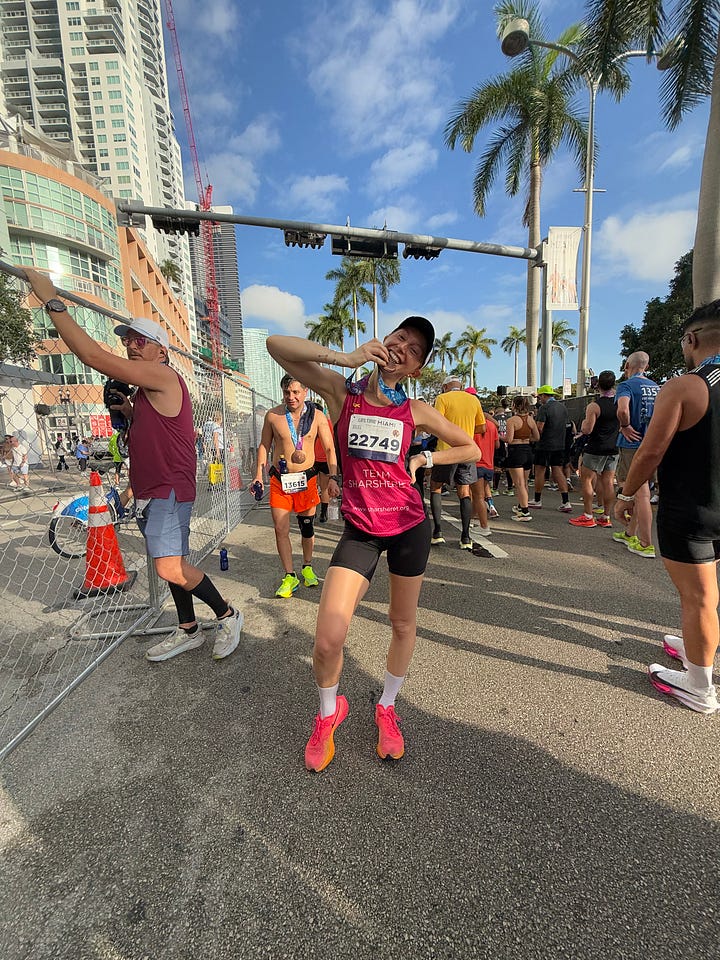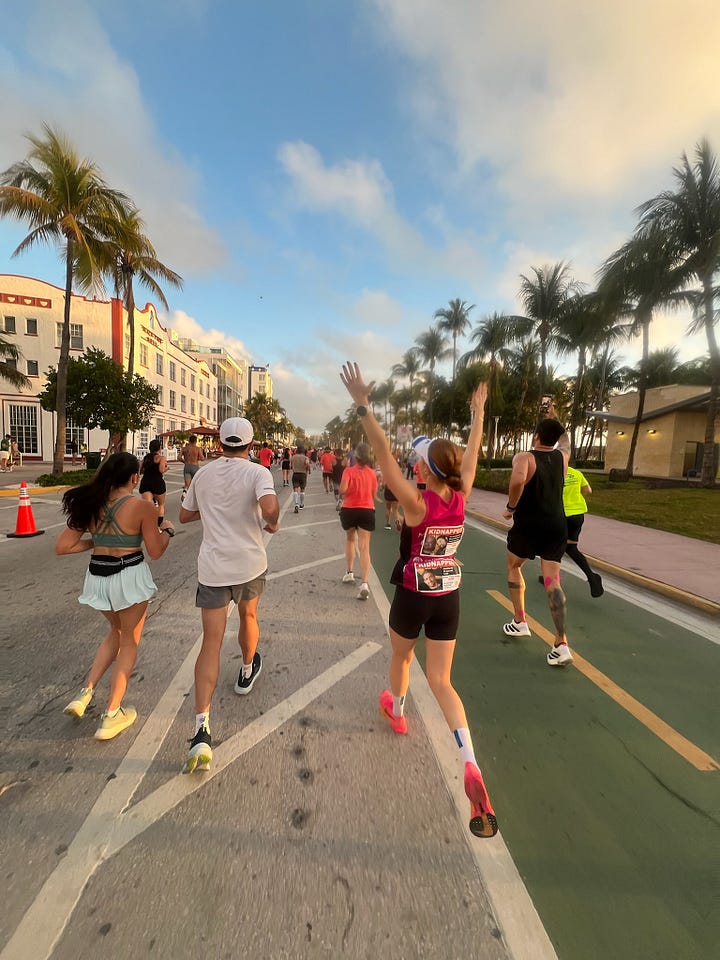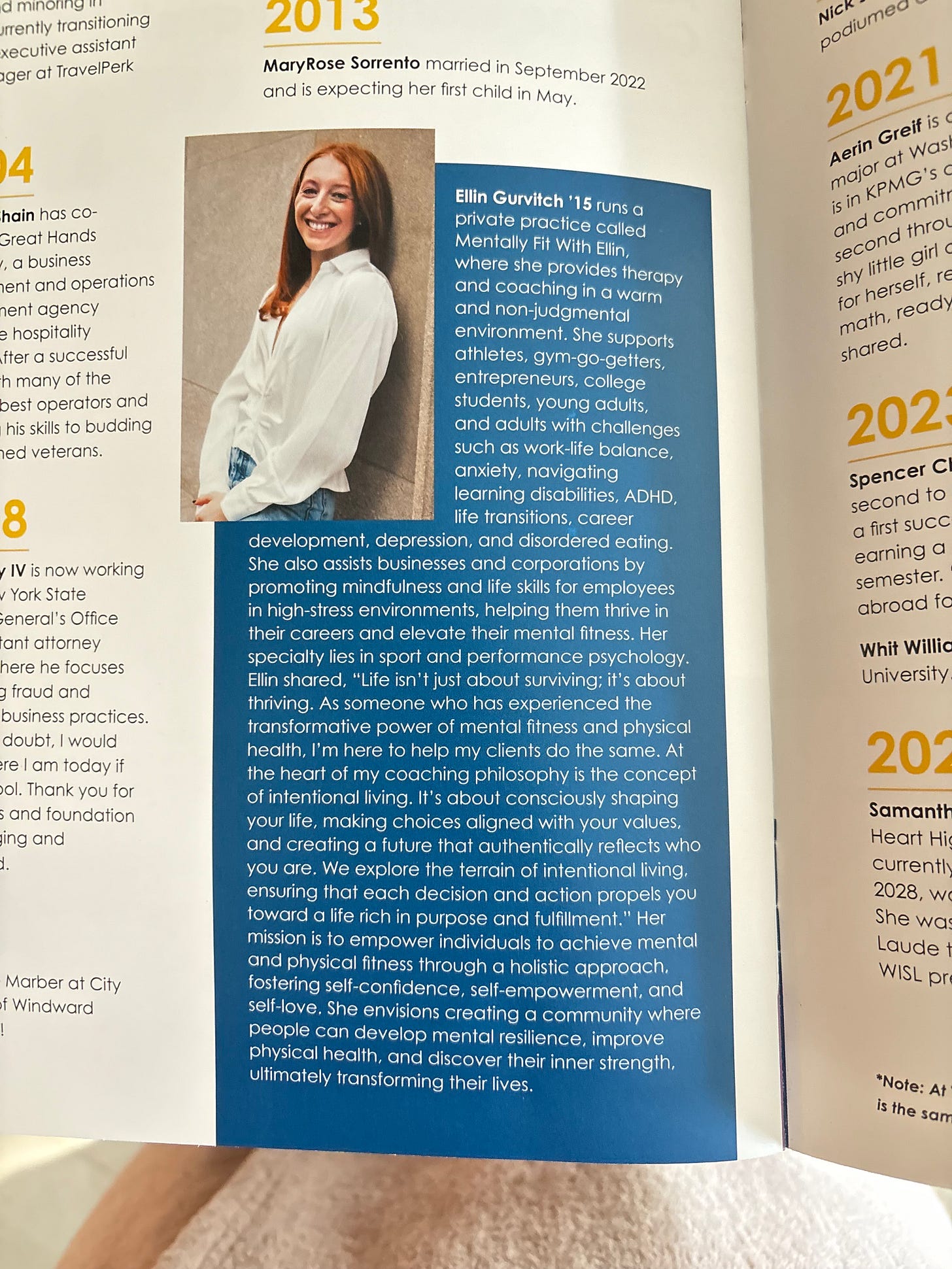How an Injury Two Weeks Before My First Half Marathon Taught Me More Than I Expected
Are you Mentally Fit?
True fitness isn’t just physical—it's training your mind to be as resilient, focused, and unstoppable as your body. At Mentally Fit With Ellin, we build strength from the inside out.
1. A Personal Story & Lesson
Two weeks before my first-ever half marathon in Miami, I was fully immersed in training—but the universe had a different plan for me.
It was Friday, January 17th, and I had a 9-mile training run on the agenda. The week had been chaotic—two major presentations, little sleep, and my body running purely on adrenaline. New York was freezing, with temperatures below 20 degrees, but I showed up, as I always do.
Two days before, on Wednesday, January 15th, I had a strong leg day at the gym—maybe too strong. My legs were sore, but I felt like I could push through.
A half mile into my run, I felt a sharp pinch in my back. "Hmm, this doesn’t feel right," I thought. But I shrugged it off. "It’ll pass," I told myself and kept going.
A mile in, the discomfort was still there. "Okay, this is not good," I thought, but I pushed on for another half mile. By mile and a half, my body made its decision. I stopped dead in my tracks.
Breaking Point
The pain was sharp, deep in my upper left glute and lower back. Every step felt like a battle. Anxiety crept in. I wanted to power through, but my body had fully shut down.
I was two miles from home, freezing, alone, and completely in shock. What is happening? My legs weren’t working. My back was screaming.
And then I started crying.
I had never stopped during a workout due to pain. Ever. A core value of mine is to finish what I start. But this? This was different. This wasn’t something I could just “push through.”
I limped home, tears streaming down my face—not just from the pain, but from the disbelief. This wasn’t supposed to happen.
Denial
I refused to accept it at first. I barely told anyone out of fear and disbelief.
I told myself, "It’s just a four-day thing. Max." I iced, stretched, foam-rolled, hit the sauna and cold plunge—did everything I could think of to heal.
But four days later? I still couldn’t run. Hell, I could barely walk properly. A week later, I couldn’t run more than a mile without pain.
That’s when reality hit. My race—the one I had trained for since August—was in less than two weeks. I had no idea if I’d even make it to the starting line.
I fought it at first. "I don’t have time for this," I told myself. But my body didn’t care about my timeline.
Surrendering (But Not Giving Up)
By day seven, I had stopped fighting. I stopped forcing it. I was devastated, but I wasn’t quitting. I was still sticking to my recovery plan, taking it one day at a time.
The Thursday night before my race, I sat at a team Sharsheret dinner, unsure of whether I’d be racing. Can you imagine how hard it was to sit there with 20 other strong women who were ready to run, while I wasn’t sure if I’d even make it to the start line? But I stayed focused. I trusted my plan, and what I could control.
As others asked how I was feeling, I’d deflect, "I’m listening to my body," which was true. The more I spoke about it, the more anxious I became, so I kept it simple. I leaned into my own mindset tools—A.P.E. (Attitude, Preparation, Effort), which I coach others on. I focused on what I could do, not what I couldn’t.
Still, inside, I was scared and frustrated as hell.
One interaction stood out: A woman asked, “Ellin, are you excited for the race?” When I mentioned my injury, she said, “No way! You look fine.”
I smiled and responded, “I’m good, but it’s internal. You can’t see it.”
It hit me: How often do we assume others are okay just because they look fine on the outside? Yes, I look strong and happy—but I was dealing with pain and uncertainty.
It made me think about the way we make assumptions based on outward appearances. What if we gave others the benefit of the doubt, instead of jumping to conclusions about how they’re feeling?
This setback provided me with the opportunity to reflect deeply:
I was more committed than I gave myself credit for. Training in the cold, following the plan, no matter how I felt—I showed up.
I needed to slow down and take care of my body the way I push it.
Just because someone looks okay doesn’t mean they’re not struggling.
I love commitment. I have grit.
And most importantly, instead of asking, "Why is this happening to me?" I reframed it: "This is happening for me."
The Final Days
Keeping these mindset shifts at the forefront of my mind, I continued my recovery plan. Each day, I was feeling better and better. I wasn't waking up in pain anymore. I tried running short distances slowly, and while it wasn’t perfect, I was making progress. At that point, I decided to go for it and give the race everything I could—just have fun. It was liberating to make that decision.
Here’s where things took another unexpected turn.
Because of my two-week injury, I hadn’t been able to test my race-day nutrition or break in my new race shoes. Yes, maybe I should have done this before those two weeks, but I didn’t. I had tried them on during a three-mile test run—and hated them.
With less than 48 hours to go, I had no idea what I was going to do. But at this point, I had to laugh. I was committed to running, no matter what.
Then, divine intervention. My best friend Emma, who was racing with me, casually mentioned that she had brought an extra pair of Nikes. I tried them on. They were a perfect fit—and they were neon pink!
At that moment, I felt like Cinderella. These were my glass slippers—with carbon plates—and they were about to carry me through my first half marathon. No blisters. A miracle in itself.
The Finish Line
Race morning, I woke up feeling unstoppable and so excited. I hardly slept. We woke up at 4:15 AM, and I had a 6:30 AM start time.
I confidently walked to the starting line, feeling gratitude and in shock that I was actually here. I took in the moment, knowing I’d give it everything I had.
As the race started, I got emotional— I don’t have to do this, I get to. Chills ran through my body, and I saw the goosebumps. I thought of my support system and smiled.
And I did it. Not only did I finish—I beat my goal, sprinting to the finish line with more in the tank in 1:49:00.





I smiled the whole way. The sneakers worked out. My nutrition? Not perfect, but it got me through. My back? No pinching or pain, just a little tightness. I had an absolute blast.
Key Takeaways and Mindset Shifts
This experience taught me more than I ever expected:
Never doubt yourself. I questioned my endurance after taking two weeks off, worrying whether I could make it through the race. Deep down, I knew I was prepared—but in the moment, doubt crept in. This reminded me that feelings aren’t always facts.
Control what you can and let go of the rest. I couldn’t control my injury, but I could control my mindset.
Your body will tell you what it needs—listen to it. Rest isn’t weakness; it’s fuel. Mental fitness means recognizing when you need to rest and having the strength to say no and take a step back.
Things won’t always go to plan, but they’ll work out in the end. Sometimes, you just need to trust the process and find humor in it.
I am an athlete. And I need to treat myself like one. I train hard, I work hard, and I push myself—but recovery is just as important as training. I know this, yet this experience was a powerful reminder.
Would I do it again?
Absolutely.
And next time?
I’ll be even better.
Connect with me on Instagram
2. Mentally Fit Mindset Hack: The Power of Reframing
One of the biggest mindset shifts that helped me through my injury and race was reframing challenges as opportunities. Instead of asking, “Why is this happening to me?”, I asked, “How is this happening for me?”—a simple yet powerful shift that changed everything.
A key part of this process? Trusting myself and my hard work.
The act of letting go and trusting that you've done the work, and that you can handle whatever comes your way, is essential. It’s easy to get caught up in self-doubt, but trusting yourself allows you to move forward with confidence and resilience.
Another important aspect of this shift was approaching my challenge with curiosity rather than judgment.
Most people’s first instinct when things don’t go as planned is to criticize themselves, get frustrated, or spiral into self-doubt.
But when we replace judgment with curiosity, we open ourselves up to solutions, growth, and resilience. This is not only a powerful mindset shift, but it's also something I teach my clients—high achievers, business professionals, parents, college students, and athletes—who often put immense pressure on themselves to perform at their best.
Whether it’s a CEO navigating career challenges, an athlete working through performance setbacks, or a parent managing daily stress, curiosity unlocks adaptability and problem-solving, while judgment keeps us stuck.
The Science Behind It
Research shows that cognitive reframing reduces stress, enhances problem-solving, and improves performance. A study in the Journal of Behavioral Therapy found that athletes who practiced reframing techniques experienced higher resilience and improved recovery times compared to those who focused on negative self-talk.
How to Build This Skill: The Three-Step Framework
Pause & Get Curious – When a challenge arises, don’t react with frustration. Instead, ask yourself: What’s really happening here? What can I learn from this?
Reframe the Narrative – Shift from “Why is this happening to me?” to “How is this helping me grow?” or “What’s the opportunity here?” This small shift changes how your brain processes the experience. Trust that each challenge you face is a chance for growth.
Take Aligned Action – Focus on what you can control. Whether it’s adjusting your plan, seeking support, or simply shifting your mindset, taking intentional action keeps you moving forward.
Whether you’re training for a race, preparing for a big work project, or navigating life’s unexpected turns, how you frame your experience determines how you move through it.
Your thoughts and emotions affect your behavior—an important aspect of Cognitive Behavioral Therapy (CBT). By becoming aware of your internal narrative and taking conscious action, you can break the cycle of judgment and self-doubt, and move into a space of trust, adaptability, and growth.
A Mentally Fit mindset isn’t about avoiding setbacks—it’s about learning to pivot, persist, and perform, no matter what comes your way, and becoming aware of your thoughts and emotions in the process.
3. What I’m Working On: A Self-Paced Program for Peak Performance
I’m in the process of building something I’m really excited about—a Mentally Fit self-paced program: “6-Week Journey to Peak Performance.”
As a licensed therapist and performance coach, I’ve worked with ambitious high achievers, business professionals, parents, college students, and athletes who push themselves hard but often struggle with stress, mindset blocks, and staying consistent. I see the same challenges come up again and again—knowing what to do but struggling to actually implement it.
That’s why I’m creating this program. It’s designed to be a stepping stone before working with me 1:1. You’ll get a taste of the exact mindset, performance, and resilience strategies I teach my private clients, but in a way that’s more accessible and self-paced. Think of it as a blueprint for mental and physical fitness, giving you the tools to build confidence, consistency, and control over your mindset.
I’d love to hear from you—does this sound like something you’d be interested in? Any feedback on what you’d want to see in a program like this? Let me know!
4. Building Connections, Creating Impact: Latest Highlights
Podcast Feature: The Sports Mom Playbook
I had the absolute pleasure of joining Rachel and Yuritza on The Sports Moms Playbook Podcast for one of my favorite conversations yet! We dove deep into mental fitness, parenting in youth sports, and the tools young athletes (and their parents) need to navigate pressure, performance anxiety, and body image struggles.
What we covered:
Mental fitness strategies to help young athletes build confidence and resilience
How parents can model self-care and support their child’s mindset
Tackling performance anxiety and body image challenges in sports
The power of mantras, visualization, and strong support systems
Encouragement and practical tips for sports moms raising young MVPs
Tune in here: Listen on Spotify
This conversation is packed with insights for parents, athletes, and anyone looking to strengthen their mental game. For more about the amazing work Sports Mom MVP is doing, check them out here: officialsportsmommvp.com
Magazine Featured in The Compass – Windward School’s Community Magazine!
I’m incredibly honored to be featured in The Compass, the biannual magazine from The Windward School, a specialized school for students with language-based learning disabilities. The magazine highlights stories from students, faculty, staff, and alumni. This recognition is deeply personal and meaningful to me.
As someone who has navigated learning disabilities and dyslexia, my journey hasn’t always been easy. But over the years, I’ve come to see these challenges as my greatest strengths—shaping how I think, learn, and approach both life and my work. To be acknowledged in this way truly feels like a full-circle moment!
For context, I attended The Windward School from 1st to 3rd grade. The foundation I built there has played a huge role in my growth, and I’m forever grateful for the support and education that helped me thrive.
Check out the digital version here—I’m on page 32: The Compass Digital Version
💡 Want to learn more about The Compass and the incredible work The Windward School is doing? Read more here!
5. Let’s Keep Building: What’s Next for You
That’s a wrap on this edition! We covered a lot—resilience in the face of setbacks, practical mindset shifts, and an exciting new self-paced program designed to help you build mental fitness at your own pace. Plus, I shared some big milestones, from a powerful podcast conversation to a full-circle moment in The Compass.
In every issue, I share strategies, insights, and tools designed for ambitious high achievers like you—athletes, professionals, parents, and students—who are looking to elevate their mental game. You can expect actionable tips, coaching techniques, and real-life examples to help you stay Mentally Fit, no matter what challenges come your way.
Let’s Stay Connected! If you’re not already following me on Instagram, join the conversation @mentallyfitwithellin, where I share daily insights, mental fitness strategies, and behind-the-scenes moments to keep you inspired.
Exciting News! My 6-week self-paced program is launching soon! It’s the perfect first step before working with me 1:1, giving you the tools to start strengthening your mindset on your own terms. Stay tuned for more details!
P.S. Studies show that adopting a growth mindset improves resilience, reduces stress, and enhances performance across all areas of life. The work we do here? It’s backed by science and proven to help you unlock your full potential.
Ready to take your mental fitness to the next level? Book a FREE consultation call, and let’s dive deeper into how these strategies can work for you.
If you enjoyed this newsletter, please subscribe and share it with others who may find value in it. I’d truly appreciate it!
Mental fitness is a journey, not a destination—let’s keep showing up and growing together!






